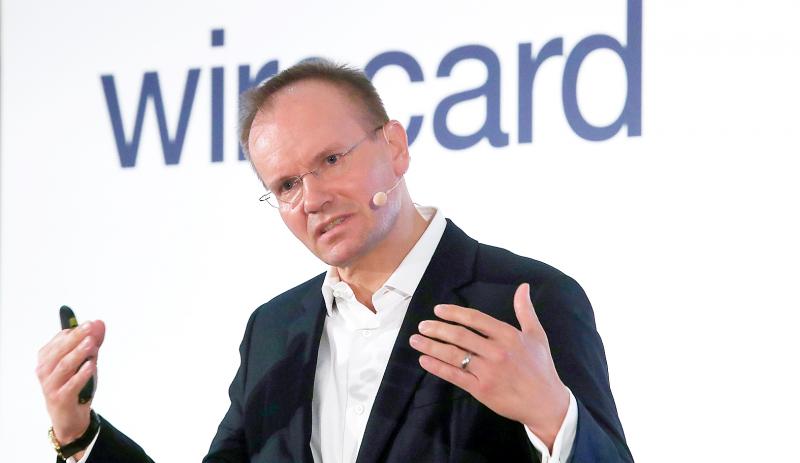Wirecard AG shares continued their free fall after the two Asian banks that were supposed to be holding 1.9 billion euros (US$2.13 billion) of missing cash denied any business relationship with the German payments company.
Wirecard now faces a potential cash crunch.
The company on Thursday warned that loans up to 2 billion euros could be terminated if its audited annual report was not published yesterday.

Photo: Reuters
Analysts at Morgan Stanley estimated that Wirecard has available cash of about 220 million euros, if it cannot locate the missing money.
BDO Unibank Inc, the Philippines’ largest bank by assets, and the Bank of the Philippine Islands (BPI) yesterday said in separate statements that Wirecard is not a client.
“It was a rogue employee who falsified documents and forged the signatures of our officers,” BDO Unibank CEO Nestor Tan said in a mobile phone message. “Wirecard is not even a depositor — we have no relationship with them.”
BPI said it continues to investigate the issue.
Wirecard shares plunged 24 percent at 9:11am in Frankfurt yesterday, taking the stock’s losses to 71 percent since Wednesday’s close.
The company that was worth 24.6 billion euros in September 2018 when it entered Germany’s DAX index is valued at about 3.4 billion euros.
The denials from BDO and BPI follow a Wirecard statement on Thursday, which claimed that auditor Ernst & Young could not confirm the location of the missing cash that was supposed to be held in Asian banks and reported that “spurious balance confirmations” had been provided.
BDO has reported the Wirecard issue to Bangko Sentral ng Pilipinas, the Philippines central bank, Tan said.
The crisis has engulfed Wirecard, which has suffered one of the worst stock slumps in the history of Germany’s benchmark index after warning that as much as 2 billion euros in loans could be called due if its audited annual report, delayed for the fourth time, was not published yesterday.
Wirecard spokespeople did not immediately return calls and e-mails for comment.
Wirecard CEO Markus Braun has painted the company as a potential victim.
Braun has been resisting calls to resign and aggressively defending the company against accusations of accounting fraud, led by a series of articles in the Financial Times.
“It cannot be ruled out that Wirecard has been the victim in a substantial case of fraud,” Braun said in a statement.
The company temporarily suspended outgoing chief operating officer Jan Marsalek, it said in a statement late on Thursday.
Marsalek — who has been suspended on a revocable basis until June 30 — had tried to get in touch with the two Asian banks and trustees over the past two days to recover the missing money, but was not successful, a person familiar with the matter said.
It is unclear if the funds can be recovered, the person added.
“Given the magnitude of the cash balances in question, new creditor risks and severity of the share price drop, we believe these board changes are unlikely to be enough to restore market confidence in the near term,” Citigroup analyst Robert Lamb said in a note yesterday.

DIVIDED VIEWS: Although the Fed agreed on holding rates steady, some officials see no rate cuts for this year, while 10 policymakers foresee two or more cuts There are a lot of unknowns about the outlook for the economy and interest rates, but US Federal Reserve Chair Jerome Powell signaled at least one thing seems certain: Higher prices are coming. Fed policymakers voted unanimously to hold interest rates steady at a range of 4.25 percent to 4.50 percent for a fourth straight meeting on Wednesday, as they await clarity on whether tariffs would leave a one-time or more lasting mark on inflation. Powell said it is still unclear how much of the bill would fall on the shoulders of consumers, but he expects to learn more about tariffs

NOT JUSTIFIED: The bank’s governor said there would only be a rate cut if inflation falls below 1.5% and economic conditions deteriorate, which have not been detected The central bank yesterday kept its key interest rates unchanged for a fifth consecutive quarter, aligning with market expectations, while slightly lowering its inflation outlook amid signs of cooling price pressures. The move came after the US Federal Reserve held rates steady overnight, despite pressure from US President Donald Trump to cut borrowing costs. Central bank board members unanimously voted to maintain the discount rate at 2 percent, the secured loan rate at 2.375 percent and the overnight lending rate at 4.25 percent. “We consider the policy decision appropriate, although it suggests tightening leaning after factoring in slackening inflation and stable GDP growth,”

Greek tourism student Katerina quit within a month of starting work at a five-star hotel in Halkidiki, one of the country’s top destinations, because she said conditions were so dire. Beyond the bad pay, the 22-year-old said that her working and living conditions were “miserable and unacceptable.” Millions holiday in Greece every year, but its vital tourism industry is finding it harder and harder to recruit Greeks to look after them. “I was asked to work in any department of the hotel where there was a need, from service to cleaning,” said Katerina, a tourism and marketing student, who would

i Gasoline and diesel prices at fuel stations are this week to rise NT$0.1 per liter, as tensions in the Middle East pushed crude oil prices higher last week, CPC Corp, Taiwan (台灣中油) and Formosa Petrochemical Corp (台塑石化) said yesterday. International crude oil prices last week rose for the third consecutive week due to an escalating conflict between Israel and Iran, as the market is concerned that the situation in the Middle East might affect crude oil supply, CPC and Formosa said in separate statements. Front-month Brent crude oil futures — the international oil benchmark — rose 3.75 percent to settle at US$77.01